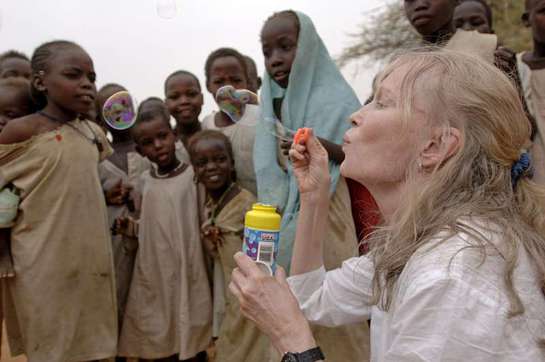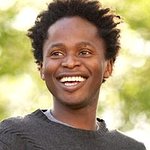Mia Farrow is an acclaimed actress and humanitarian activist who, for the past 10 years, has served as a Goodwill Ambassador to UNICEF. She has travelled extensively to places such as Darfur in Sudan, Chad and the Democratic Republic of the Congo, where she has met with the victims of conflict and worked to bring greater international attention to humanitarian crises.

Credit/Copyright: UNHCR
Recently, she completed a personal project to match photographs taken during her travels to the John Lennon song, “Imagine.” The video can be seen here.
Tim Irwin, UNHCR’s communications officer in Washington, DC, recently spoke to Mia Farrow about the project. Here are some excerpts of the interview:
What was your idea behind making this project?
I have taken a lot of photographs over the years – some of them on trips with UNICEF, some of them on my own journeys – and I was listening to the song at the time that would have been John Lennon’s 70th birthday. I came to the line, “Imagine no possessions, I wonder if you can,” and I went to some of the photographs where it didn’t require imagining for me. I’ve witnessed people with nothing. And then I thought: Was there something I could put together? I think the song is such a beautiful song, in its message, in its melody. I chose the pictures to go with the lyrics. I had returned from Uganda with UNICEF and I wanted to bring it emotionally to the destructive forces that have displaced all the people in the photographs. And I wanted to end with the dreamer and the thought: “If only the world could live as one.”
Many of the photographs are of refugees and refugee children. Was that a deliberate choice?
Yes. My focus has been on people who are displaced primarily by conflict. Exceptions would be places like Haiti, but there, too, people are longing for peace. So many people there have nothing and they’re longing for peace, peace of mind. There are all kinds of peace.
You have been able to move between these two extreme worlds of people in refugee camps and then life in the United States. Do you think that people understand what it’s like to be a refugee?
How can we? Even though I might spend a lot of time in these situations – I’ve made 13 journeys to the Darfur region alone – I have a passport out. While I have experienced their circumstances, the huge difference is that I can leave and they can’t. So I can never really fully understand their position and I hope I never will be in a similar position. But if I am, I hope that I will have the grace and the strength to maintain the hope that they have.
Were you hoping the slide show would inspire people or to provoke them in some way?
I wanted people to get angry, really. I wanted people to feel a sense of outrage that while we go about our business – and I know many people in my country and elsewhere are having difficult times – that we can scarcely imagine having nothing. I think that if people look into the eyes of our fellow human beings who have literally nothing, not even safety, then are we not compelled to do something?
On December 14, UNHCR marked 60 years since its creation. What are your thoughts looking forward?
I think in the face of displacement it’s our feelings of helplessness that are our worst enemy. They are an indulgence that we can’t give in to. And that comes to why I love UNHCR so much, because you’re addressing the needs of the most vulnerable population on earth. I think the saddest person in the world is the one who did nothing because they could only do a little. We can all find ways to reach out to those who are in need.
Read more here.




